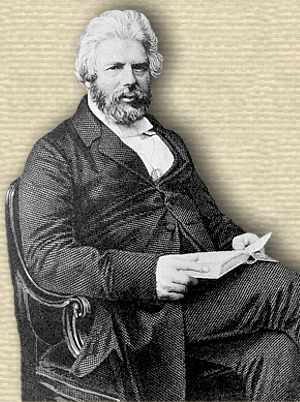 (source)
(source)
|
Robert Chambers
(10 Jul 1802 - 17 Mar 1871)
Scottish naturalist and publisher who co-founded W. & R. Chambers, Ltd., in Edinburgh (1832), publisher of Chambers's Encyclopaedia (1859-68) among many other works. He anonymously wrote a controversial book, Vestiges of the Natural History of Creation (1844).
|
Science Quotes by Robert Chambers (7 quotes)
A comparatively small variety of species is found in the older rocks, although of some particular ones the remains are very abundant; ... Ascending to the next group of rocks, we find the traces of life become more abundant, the number of species extended.
— Robert Chambers
Vestiges of the Natural History of Creation (1844), 60-1.
But the idea that any of the lower animals have been concerned in any way with the origin of man—is not this degrading? Degrading is a term, expressive of a notion of the human mind, and the human mind is liable to prejudices which prevent its notions from being invariably correct. Were we acquainted for the first time with the circumstances attending the production of an individual of our race, we might equally think them degrading, and be eager to deny them, and exclude them from the admitted truths of nature.
— Robert Chambers
Geology fully proves that organic creation passed through a series of stages before the highest vegetable and animal forms appeared.
— Robert Chambers
Explanations (1845), 31
It is most interesting to observe into how small a field the whole of the mysteries of nature thus ultimately resolve themselves. The inorganic has one final comprehensive law, GRAVITATION. The organic, the other great department of mundane things, rests in like manner on one law, and that is,—DEVELOPMENT. Nor may even these be after all twain, but only branches of one still more comprehensive law, the expression of that unity which man's wit can scarcely separate from Deity itself.
— Robert Chambers
Vestiges of the Natural History of Creation (1844), 360.
The hypothesis of the connexion of the first limestone beds with the commencement of organic life upon our planet is supported by the fact, that in these beds we find the first remains of the bodies of animated creatures.
— Robert Chambers
Vestiges of the Natural History of Creation (1844), 57.
The organic creation, as we now see it ... was not placed upon the earth at once:—it observed a PROGRESS.
— Robert Chambers
Explanations (1845), 30.
This statistical regularity in moral affairs fully establishes their being under the presidency of law. Man is seen to be an enigma only as an individual: in the mass he is a mathematical problem.
— Robert Chambers
Vestiges of the Natural History of Creation (1844), 331.
See also:
- 10 Jul - short biography, births, deaths and events on date of Chambers's birth.

 In science it often happens that scientists say, 'You know that's a really good argument; my position is mistaken,' and then they would actually change their minds and you never hear that old view from them again. They really do it. It doesn't happen as often as it should, because scientists are human and change is sometimes painful. But it happens every day. I cannot recall the last time something like that happened in politics or religion.
(1987) --
In science it often happens that scientists say, 'You know that's a really good argument; my position is mistaken,' and then they would actually change their minds and you never hear that old view from them again. They really do it. It doesn't happen as often as it should, because scientists are human and change is sometimes painful. But it happens every day. I cannot recall the last time something like that happened in politics or religion.
(1987) -- 


